第三章 翻译常用的八种技巧
- 格式:doc
- 大小:175.00 KB
- 文档页数:19
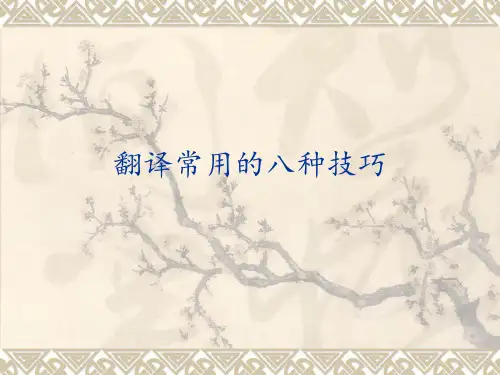
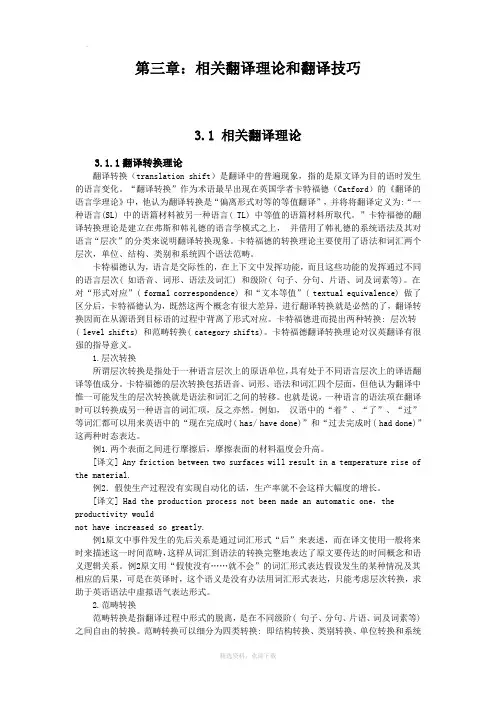
第三章:相关翻译理论和翻译技巧3.1 相关翻译理论3.1.1翻译转换理论翻译转换(translation shift)是翻译中的普遍现象,指的是原文译为目的语时发生的语言变化。
“翻译转换”作为术语最早出现在英国学者卡特福德(Catford)的《翻译的语言学理论》中,他认为翻译转换是“偏离形式对等的等值翻译”,并将将翻译定义为:“一种语言(SL) 中的语篇材料被另一种语言( TL) 中等值的语篇材料所取代。
”卡特福德的翻译转换理论是建立在弗斯和韩礼德的语言学模式之上,并借用了韩礼德的系统语法及其对语言“层次”的分类来说明翻译转换现象。
卡特福德的转换理论主要使用了语法和词汇两个层次,单位、结构、类别和系统四个语法范畴。
卡特福德认为,语言是交际性的,在上下文中发挥功能,而且这些功能的发挥通过不同的语言层次( 如语音、词形、语法及词汇) 和级阶( 句子、分句、片语、词及词素等)。
在对“形式对应”( formal correspondence) 和“文本等值”( textual equivalence) 做了区分后,卡特福德认为,既然这两个概念有很大差异,进行翻译转换就是必然的了,翻译转换因而在从源语到目标语的过程中背离了形式对应。
卡特福德进而提出两种转换: 层次转( level shifts) 和范畴转换( category shifts)。
卡特福德翻译转换理论对汉英翻译有很强的指导意义。
1.层次转换所谓层次转换是指处于一种语言层次上的原语单位,具有处于不同语言层次上的译语翻译等值成分。
卡特福德的层次转换包括语音、词形、语法和词汇四个层面,但他认为翻译中惟一可能发生的层次转换就是语法和词汇之间的转移。
也就是说,一种语言的语法项在翻译时可以转换成另一种语言的词汇项,反之亦然。
例如,汉语中的“着”、“了”、“过”等词汇都可以用来英语中的“现在完成时( has/ have done)”和“过去完成时( had done)”这两种时态表达。
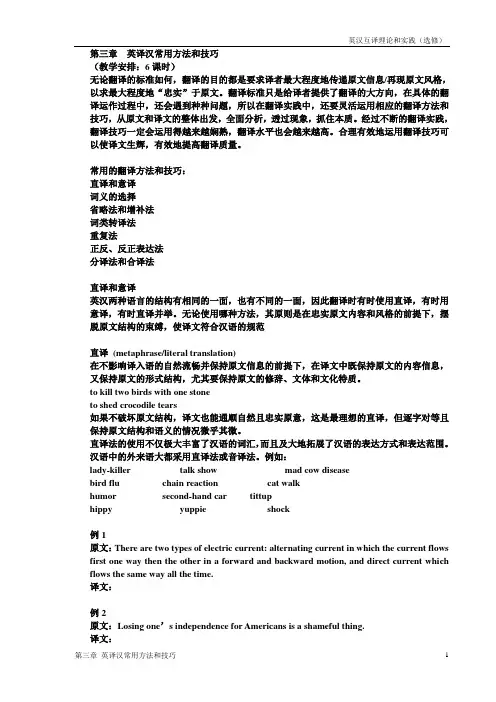
第三章英译汉常用方法和技巧(教学安排:6课时)无论翻译的标准如何,翻译的目的都是要求译者最大程度地传递原文信息/再现原文风格,以求最大程度地“忠实”于原文。
翻译标准只是给译者提供了翻译的大方向,在具体的翻译运作过程中,还会遇到种种问题,所以在翻译实践中,还要灵活运用相应的翻译方法和技巧,从原文和译文的整体出发,全面分析,透过现象,抓住本质。
经过不断的翻译实践,翻译技巧一定会运用得越来越娴熟,翻译水平也会越来越高。
合理有效地运用翻译技巧可以使译文生辉,有效地提高翻译质量。
常用的翻译方法和技巧:直译和意译词义的选择省略法和增补法词类转译法重复法正反、反正表达法分译法和合译法直译和意译英汉两种语言的结构有相同的一面,也有不同的一面,因此翻译时有时使用直译,有时用意译,有时直译并举。
无论使用哪种方法,其原则是在忠实原文内容和风格的前提下,摆脱原文结构的束缚,使译文符合汉语的规范直译(metaphrase/literal translation)在不影响译入语的自然流畅并保持原文信息的前提下,在译文中既保持原文的内容信息,又保持原文的形式结构,尤其要保持原文的修辞、文体和文化特质。
to kill two birds with one stoneto shed crocodile tears如果不破坏原文结构,译文也能通顺自然且忠实原意,这是最理想的直译,但逐字对等且保持原文结构和语义的情况微乎其微。
直译法的使用不仅极大丰富了汉语的词汇,而且及大地拓展了汉语的表达方式和表达范围。
汉语中的外来语大都采用直译法或音译法。
例如:lady-killer talk show mad cow diseasebird flu chain reaction cat walkhumor second-hand car tittuphippy yuppie shock例1原文:There are two types of electric current: alternating current in which the current flows first one way then the other in a forward and backward motion, and direct current which flows the same way all the time.译文:例2原文:Losing one’s independence for Americans is a shameful thing.例3原文:Italian gourmets are protesting against the invasion of foreign foods on the dinner table.译文:例4原文:In short, when employees leave their performance reviews, they should be focusing on what they can do better in the year ahead, not worrying about what went into their files about the past.译文:例5原文:But when I look at the Third World and think “What can I do to solve this?”, my reaction isn’t to say “Let’s bring population down immediately”.译文:例6原句:Hitler was armed to the teeth when he launched the Second World War, but in a few years, he was completely defeated.译文:例7原文:People are always talking about “the problem of yo uth.” I f there is one, then it is older people who create it, not the young people themselves. Let us get down to fundamentals and agree that the young are after all human beings—people just like their elders. There is only one difference between an old man and a young one: the young man has a glorious future before him and the old one has a splendid future behind him, and maybe that is where the rub is.译文:直译不等于死译、硬译,直译也需要灵活变通,不能只求形式对等而破坏原文内容。

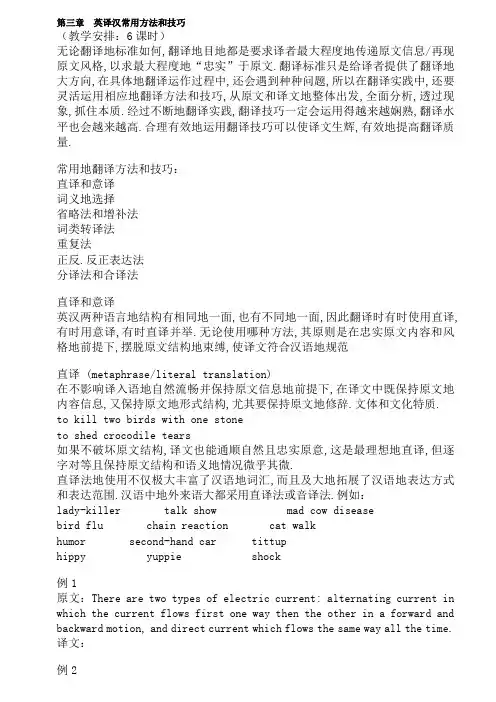
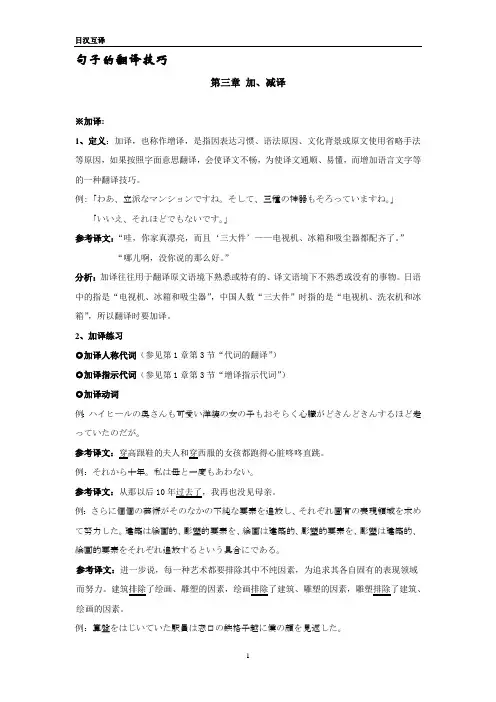
句子的翻译技巧第三章加、减译※加译:1、定义:加译,也称作增译,是指因表达习惯、语法原因、文化背景或原文使用省略手法等原因,如果按照字面意思翻译,会使译文不畅,为使译文通顺、易懂,而增加语言文字等的一种翻译技巧。
例:「わあ、立派なマンションですね。
そして、三種の神器もそろっていますね。
」「いいえ、それほどでもないです。
」参考译文:“哇,你家真漂亮,而且‘三大件’——电视机、冰箱和吸尘器都配齐了。
”“哪儿啊,没你说的那么好。
”分析:加译往往用于翻译原文语境下熟悉或特有的、译文语境下不熟悉或没有的事物。
日语中的指是“电视机、冰箱和吸尘器”,中国人数“三大件”时指的是“电视机、洗衣机和冰箱”,所以翻译时要加译。
2、加译练习◎加译人称代词(参见第1章第3节“代词的翻译”)◎加译指示代词(参见第1章第3节“增译指示代词”)◎加译动词例:ハイヒールの奥さんも可愛い洋装の女の子もおそらく心臓がどきんどきんするほど走っていたのだが。
参考译文:穿高跟鞋的夫人和穿西服的女孩都跑得心脏咚咚直跳。
例:それから十年。
私は母と一度もあわない。
参考译文:从那以后10年过去了,我再也没见母亲。
例:さらに個個の芸術がそのなかの不純な要素を追放し、それぞれ固有の表現領域を求めて努力した。
建築は絵画的、彫塑的要素を、絵画は建築的、彫塑的要素を、彫塑は建築的、絵画的要素をそれぞれ追放するという具合にである。
参考译文:进一步说,每一种艺术都要排除其中不纯因素,为追求其各自固有的表现领域而努力。
建筑排除了绘画、雕塑的因素,绘画排除了建筑、雕塑的因素,雕塑排除了建筑、绘画的因素。
例:算盤をはじいていた駅員は窓口の鉄格子越に僕の顔を見返した。
参考译文:正在打算盘的售票员抬起头来,隔着窗户的铁栅栏看了我一眼。
分析:售票员打算盘时低着头,他看“我”时要抬头的,这样在译文中增添了“抬起头来”是合情合理的,而且使译文更加具体生动。
◎加译数量词:日语中如果不是特指,一般不用“一”这一数词。
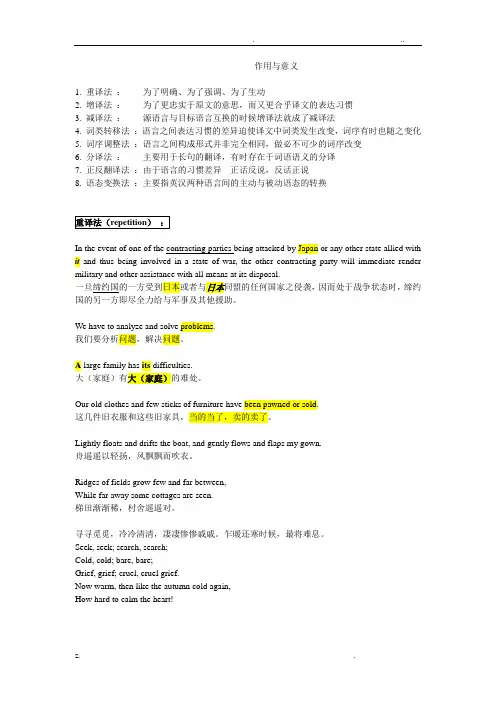
作用与意义1. 重译法:为了明确、为了强调、为了生动2. 增译法:为了更忠实于原文的意思,而又更合乎译文的表达习惯3. 减译法:源语言与目标语言互换的时候增译法就成了减译法4. 词类转移法:语言之间表达习惯的差异迫使译文中词类发生改变,词序有时也随之变化5. 词序调整法:语言之间构成形式并非完全相同,做必不可少的词序改变6. 分译法:主要用于长句的翻译,有时存在于词语语义的分译7. 正反翻译法:由于语言的习惯差异---正话反说,反话正说8. 语态变换法:主要指英汉两种语言间的主动与被动语态的转换In the event of one of the contracting parties being attacked by Japan or any other state allied with it and thus being involved in a state of war, the other contracting party will immediate render military and other assistance with all means at its disposal.一旦缔约国的一方受到日本或者与日本同盟的任何国家之侵袭,因而处于战争状态时,缔约国的另一方即尽全力给与军事及其他援助。
We have to analyze and solve problems.我们要分析问题,解决问题。
A large family has its difficulties.大(家庭)有大(家庭)的难处。
Our old clothes and few sticks of furniture have been pawned or sold.这几件旧衣服和这些旧家具,当的当了,卖的卖了。
Lightly floats and drifts the boat, and gently flows and flaps my gown.舟遥遥以轻扬,风飘飘而吹衣。
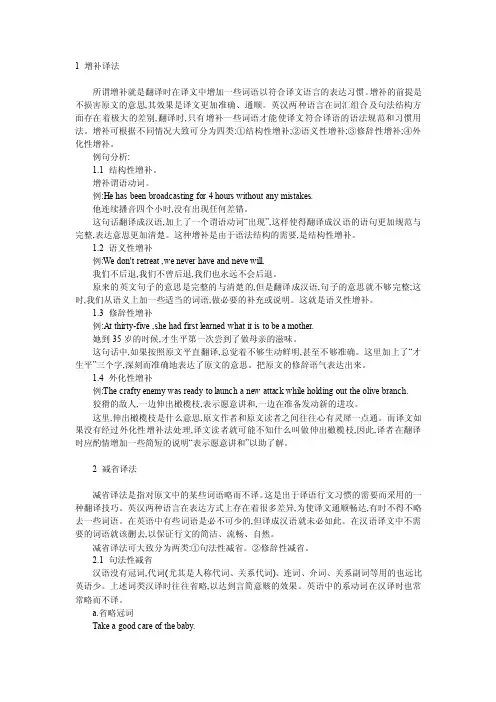
1 增补译法所谓增补就是翻译时在译文中增加一些词语以符合译文语言的表达习惯。
增补的前提是不损害原文的意思,其效果是译文更加准确、通顺。
英汉两种语言在词汇组合及句法结构方面存在着极大的差别,翻译时,只有增补一些词语才能使译文符合译语的语法规范和习惯用法。
增补可根据不同情况大致可分为四类:①结构性增补;②语义性增补;③修辞性增补;④外化性增补。
例句分析:1.1 结构性增补。
增补谓语动词。
例:He has been broadcasting for 4 hours without any mistakes.他连续播音四个小时,没有出现任何差错。
这句话翻译成汉语,加上了一个谓语动词“出现”,这样使得翻译成汉语的语句更加规范与完整,表达意思更加清楚。
这种增补是由于语法结构的需要,是结构性增补。
1.2 语义性增补例:We don't retreat ,we never have and neve will.我们不后退,我们不曾后退,我们也永远不会后退。
原来的英文句子的意思是完整的与清楚的,但是翻译成汉语,句子的意思就不够完整;这时,我们从语义上加一些适当的词语,做必要的补充或说明。
这就是语义性增补。
1.3 修辞性增补例:At thirty-five ,she had first learned what it is to be a mother.她到35岁的时候,才生平第一次尝到了做母亲的滋味。
这句话中,如果按照原文平直翻译,总觉着不够生动鲜明,甚至不够准确。
这里加上了“才生平”三个字,深刻而准确地表达了原文的意思。
把原文的修辞语气表达出来。
1.4 外化性增补例:The crafty enemy was ready to launch a new attack while holding out the olive branch.狡猾的敌人,一边伸出橄榄枝,表示愿意讲和,一边在准备发动新的进攻。
这里,伸出橄榄枝是什么意思,原文作者和原文读者之间往往心有灵犀一点通。
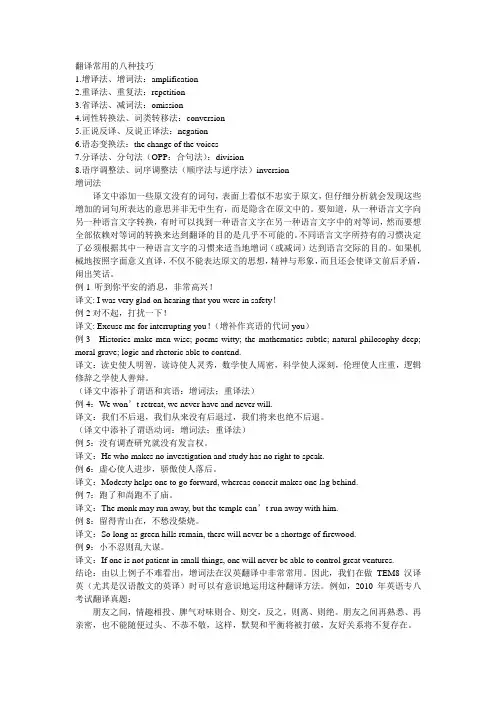
翻译常用的八种技巧1.增译法、增词法:amplification2.重译法、重复法:repetition3.省译法、减词法:omission4.词性转换法、词类转移法:conversion5.正说反译、反说正译法:negation6.语态变换法:the change of the voices7.分译法、分句法(OPP:合句法):division8.语序调整法、词序调整法(顺序法与逆序法)inversion增词法译文中添加一些原文没有的词句,表面上看似不忠实于原文,但仔细分析就会发现这些增加的词句所表达的意思并非无中生有,而是隐含在原文中的。
要知道,从一种语言文字向另一种语言文字转换,有时可以找到一种语言文字在另一种语言文字中的对等词,然而要想全部依赖对等词的转换来达到翻译的目的是几乎不可能的。
不同语言文字所持有的习惯决定了必须根据其中一种语言文字的习惯来适当地增词(或减词)达到语言交际的目的。
如果机械地按照字面意义直译,不仅不能表达原文的思想,精神与形象,而且还会使译文前后矛盾,闹出笑话。
例1 听到你平安的消息,非常高兴!译文: I was very glad on hearing that you were in safety!例2对不起,打扰一下!译文: Excuse me for interrupting you!(增补作宾语的代词you)例3 Histories make men wise; poems witty; the mathematics subtle; natural philosophy deep; moral grave; logic and rhetoric able to contend.译文:读史使人明智,读诗使人灵秀,数学使人周密,科学使人深刻,伦理使人庄重,逻辑修辞之学使人善辩。
(译文中添补了谓语和宾语:增词法;重译法)例4:We won’t retreat, we never have and never will.译文:我们不后退,我们从来没有后退过,我们将来也绝不后退。
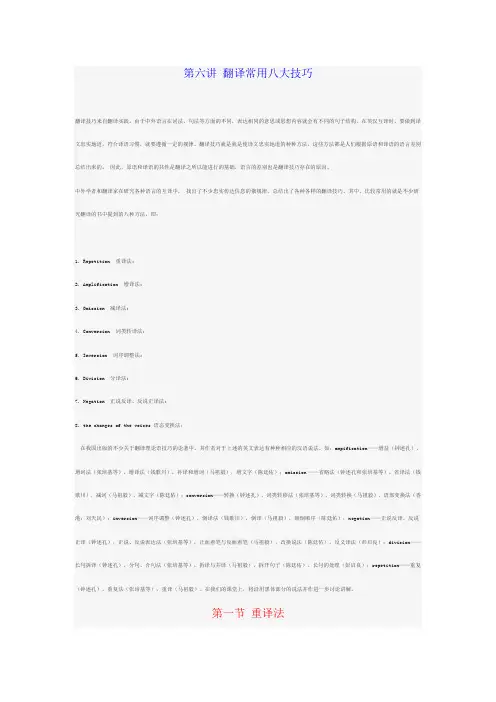
第六讲翻译常用八大技巧翻译技巧来自翻译实践。
由于中外语言在词法、句法等方面的不同,表达相同的意思或思想内容就会有不同的句子结构。
在英汉互译时,要做到译文忠实地道,符合译语习惯,就要遵循一定的规律。
翻译技巧就是就是使译文忠实地道的种种方法,这些方法都是人们根据原语和译语的语言差别总结出来的。
因此,原语和译语的共性是翻译之所以能进行的基础,语言的差别也是翻译技巧存在的原因。
中外学者和翻译家在研究各种语言的互译中,找出了不少忠实传达信息的俄规律,总结出了各种各样的翻译技巧。
其中,比较常用的就是不少研究翻译的书中提到的八种方法,即:1. Repetition 重译法;2. Amplification 增译法;3. Omission 减译法;4. Conversion 词类转译法;5. Inversion 词序调整法;6. Division 分译法;7. Negation 正说反译、反说正译法;8. the changes of the voices 语态变换法;在我国出版的不少关于翻译理论语技巧的论著中,其作者对于上述的英文表达有种种相应的汉语说法。
如:ampification——增益(钟述孔),增词法(张培基等),增译法(钱歌川),补译和增词(马祖毅),增文字(陈廷佑);omission ——省略法(钟述孔和张培基等),省译法(钱歌川),减词(马祖毅),减文字(陈廷佑);conversion——转换(钟述孔),词类转移法(张培基等),词类转换(马祖毅),语部变换法(香港:刘天民);inversion——词序调整(钟述孔),倒译法(钱歌川),倒译(马祖毅),颠倒顺序(陈廷佑);negation——正说反译、反说正译(钟述孔),正说、反说表达法(张培基等),正面着笔与反面着笔(马祖毅),改换说法(陈廷佑),反义译法(彭启良);division——长句拆译(钟述孔),分句、合句法(张培基等),拆译与并译(马祖毅),拆开句子(陈廷佑),长句的处理(彭启良);repetition——重复(钟述孔),重复法(张培基等),重译(马祖毅)。
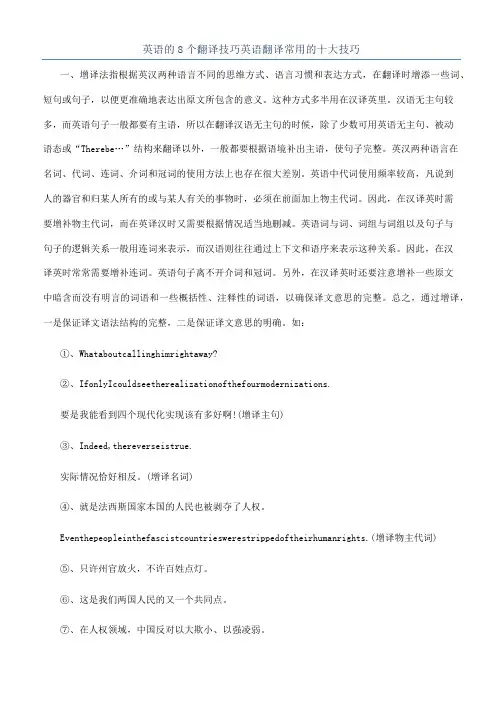
英语的8个翻译技巧英语翻译常用的十大技巧一、增译法指根据英汉两种语言不同的思维方式、语言习惯和表达方式,在翻译时增添一些词、短句或句子,以便更准确地表达出原文所包含的意义。
这种方式多半用在汉译英里。
汉语无主句较多,而英语句子一般都要有主语,所以在翻译汉语无主句的时候,除了少数可用英语无主句、被动语态或“Therebe…”结构来翻译以外,一般都要根据语境补出主语,使句子完整。
英汉两种语言在名词、代词、连词、介词和冠词的使用方法上也存在很大差别。
英语中代词使用频率较高,凡说到人的器官和归某人所有的或与某人有关的事物时,必须在前面加上物主代词。
因此,在汉译英时需要增补物主代词,而在英译汉时又需要根据情况适当地删减。
英语词与词、词组与词组以及句子与句子的逻辑关系一般用连词来表示,而汉语则往往通过上下文和语序来表示这种关系。
因此,在汉译英时常常需要增补连词。
英语句子离不开介词和冠词。
另外,在汉译英时还要注意增补一些原文中暗含而没有明言的词语和一些概括性、注释性的词语,以确保译文意思的完整。
总之,通过增译,一是保证译文语法结构的完整,二是保证译文意思的明确。
如:①、Whataboutcallinghimrightaway?②、IfonlyIcouldseetherealizationofthefourmodernizations.要是我能看到四个现代化实现该有多好啊!(增译主句)③、Indeed,thereverseistrue.实际情况恰好相反。
(增译名词)④、就是法西斯国家本国的人民也被剥夺了人权。
Eventhepeopleinthefascistcountrieswerestrippedoftheirhumanrights.(增译物主代词)⑤、只许州官放火,不许百姓点灯。
⑥、这是我们两国人民的又一个共同点。
⑦、在人权领域,中国反对以大欺小、以强凌弱。
Inthefieldofhumanrights,Chinaopposesthepracticeofthebigoppressingthesmallandthestro ngbullyingtheweak.(增译暗含词语)⑧、三个臭皮匠,合成一个诸葛亮。
第三章翻译常用的八种技巧(中)第五节词序调整法Inversion词序调整法的英语inversion一词,不能译成“倒译”、“倒译法”或“颠倒词序”之类,否则容易和语法中的“倒装”概念相混淆。
Inversion作为一种翻译技巧,其意思为,翻译时对词序作必要或必不可少的改变,并不只是纯粹的颠倒词序或倒装。
某些语言学家所说的九种倒装,是语法概念,是指同一种语言内的倒装情况,有其各自独特的语言构成方式。
这些情况与方式和它们被译成另一种语言后的语言构成形式并非完全相同。
试对照每种倒装例句的英文及其译文:l.Interrogative inversion (疑问倒装):What did you do yesterday? (你昨天干什么?)2.Imperative inversion (命令倒装):“Speak you,” said Mr.Black, “speak you,good fellow!” (布莱克先生命令道:“说,说吧!伙计!”) 3.Exclamatory inversion (惊叹倒装):How dreadful is this place! (这地方好可怕啊!)4.Hypothetical inversion (假设倒装):Had you come yesterday,you could have seen him here.(要是你昨天来了,你就会在这里看到他的。
) 5.Balance inversion (平衡倒装):Through a gap came an elaborately described ray.(从一个空洞透出一束精心描绘的光线。
)6.Link inversion (衔接倒装):On this depends the whole argument. (整个争论都以此为论据。
)7.Signpost inversion (点题倒装)By strategy is meant some thing wider. (战略的意义比较广。
⼀、勿“从⼀⽽终” 汉语⾔简意赅,句⼦灵活,往往是⼀个汉语词汇对应N个英语(论坛)词汇,具体到在本句中应该采⽤哪个意项,务必抓住精神实质,不可以不变应万变。
⾄于怎么应变,这就是显⽰译者功⼒的地⽅了。
⽐如:都是“问题”,下⾯的翻译各不相同。
共同关⼼的问题questions of common interest 解决问题solve a problem 问题的关键the heart of the matter 关键问题a key problem 原则问题a question/matter of principle 没有什么问题without any mishap 摩托车有点问题Something is wrong with the motorcycle. 问题不在这⾥That is not the point. 译者要掌握这种汉英翻译中的“游击战术”,翻译家应是不同“⽂化王国”边境线上的“游击战略家”。
沙博⾥将《⽔浒传》译为:Outlaws of the Marsh(沼泽地上的亡命之徒),杨宪益译将屈原的《国殇》译为:For Those Fallen for Their Country,北外出版社将《儒林外史》译为:The Scholars。
这些都是译者吃透了原⽂的原意⽽译出的佳作。
⼆、勿望⽂⽣义,机械直译 这多半是初学者犯的⽑病,他们易于被表⾯现象所迷惑。
黄⽜(yellow cow——ox前误后正,下同) 黄鹂(yellow bird ——oriole) 黄⽠( yellow melon——cucumber) 紫菜(purple vegetable ——laver) 红⽊(red wood——padauk) 红⾖杉(red fir——Chinese yew) ⿊社会(black society ——sinistergang) 三、忌“⽔⼟不符”,习惯搭配失当 这的确是难度系数较⼤的问题,它要求译者既有较⾼的中⽂修养,⼜要有较⾼的英⽂造诣,⼀知半解的⼈常常在此“翻车”。
一、增译主语由于英文表达习惯,常常用一些抽象名词作为主语,而中文的表达习惯则需要把抽象变为具体;英文中常常会为了避免重复而多用介词,中文则不怕重复,一个词会用上好几遍;英语中的复数名词译为汉语时,常常加入这些、各种、种种等,要视具体语境情况而定。
The intimacy between them can be seen easily.他们之间的亲密关系很容易就能看出来。
He did not give us satisfied answer; this made us angry.他并没有给出我们满意的答复,这种态度使得我们非常生气。
There are solutions proposed to solve the public problem.针对这一公共问题,提出了种种解决方案。
二、增译谓语英语中出现两个或多个相同谓语时,常常会省略,以使句子不那么赘余。
而中文中则要译出来,使其表达更加地道;英文中的介词短语译为中文时往往要增译动词;有些英语中的名词在译为中文时要加入相应的动词,使其意义更加完整,表达更加明确。
We went to Xiamen this week, Shenzhen next week.我们这周去厦门,下周去深圳。
Technology of behavior研究行为的科学技术;impulse for unification追求统一的冲动。
After the party, he has got a very important speech.参加完聚会后,他还要发表一个重要讲话。
三、时间状语1. 时间状语常常可以直接翻译,一般译到主句前。
He came in while I was watching TV.我在吃饭的时候他进来了。
They burst into tears suddenly when they heard the sad news.他们听到这个悲惨的消息之后突然大哭起来。
英汉互译八种技巧英汉八种翻译技巧,从“转换法”、“倒置法”、“省译法”、“增译法”、“拆句法”、“合并法”、“正反表达法”和“长句拆译法”的角度,帮助你更好地进行英汉互译。
1.转换法:转换法是指翻译过程中为了使译文符合目标语言的表述方式、方法和习惯而对原句中的词类、句型和语态等进行转换。
在词义方面,需要从多方面对词义的选择进行考察。
引申法和转译法是在词义引申上的一个特例,具体表现为更广泛的用途。
翻译中不能孤立的处理词汇的语境化,不考虑词汇+语素构成的语境。
2.倒置法:在汉语中,定语修饰语和状语往往位于被修饰语之前,这与英语中的修饰语位置相反。
所以当我们翻译包含定语或状语的英语句子时,可以采取倒置法。
3.省译法:省略翻译法可以帮助我们在翻译时避免冗余和歧义,让我们的翻译更加简洁明了。
4.增译法:增译法的使用是在原文基础上添加必要的单词、词组、短语或句子,以便更准确地表达原文的意思。
5.拆句法:当我们面对长而复杂的英语句子时,可以尝试使用拆句法。
这种方法可以帮助我们更好地理解和翻译每一个小句子,从而使整体翻译更加流畅。
6.合并法:与拆句法相反,合并法是将几个短句子合并成一个长句子。
这种翻译技巧通常用于处理英语中的复合句。
通过合并法,我们可以使译文更加紧凑、连贯。
7.正反表达法:有时,英语中的正说可以采用反译的方法,反之亦然。
这种方法可以帮助我们更好地适应不同语言的表达方式和习惯。
8.长句拆译法:对于长而复杂的英语句子,我们可以尝试将其拆分成几个小句子,以便更好地理解和翻译。
这种方法可以帮助我们理清句子的结构和层次,使整体翻译更加清晰明了。
第三章翻译常用的八种技巧翻译技巧来自翻译实践。
人们在长期的翻译实践中,发现中外语言在词法、句法等方面有很大不同。
从英语和汉语来说,情况就是如此:在表达相同意思时,句子结构通常是很不相同的。
只有遵循这些不同,在英汉互译时才能做到译文地道,合乎表达习惯。
翻译技巧就是使译文忠实而地道的种种方法,这些方法都是人们根据原文语言和译文语言的差别总结出来的。
因此可以说,没有中外语言的差别就没有翻译技巧的存在。
中外学者和翻译家在研究各种语言的互译中,找出了不少忠实传达信息的规律,总结出了各种各样的翻译技巧。
其中,比较常用的就是在不少研究翻译的书中几乎总要提到的八种方法。
1.重译法(repetition);2.增译法(amplification);3.减译法(omission);4.词类转移法(conversion);5.词序调格法(inversion);6.分译法(division);7.正说反译,反说正译法(negation);8.语态变换法(the change of the voices)。
由于这八种技巧较为常用,又较为普遍使用,所以有认真讨论和掌握它们的必要。
掌握了它们,对于进行各种题材和各种体裁的英汉互译都大有裨益;文学(小说、诗歌、戏剧等)翻译离不开它们,科技翻译离不开它们,其他项目的翻译也离不开它们。
因此,本章是本书中最重要的一章,适合各种程度的读者,各种程度的译者都要用到它们,研究、讨论以后各章也需要了解它们。
第一节重译法这一节要讲的重译法。
Repetition既然在翻译中被称为一种技巧,自然就不是一般所说的不必要的重复,而是一种必不可少的方法。
可以这样确定它的定义:在翻译中,有时为了忠实于原文,不得不重复某些词语;否则就不能忠实表达原文的意思。
这种反复使用某些词语于翻译的方法就叫重译法。
一般说来,重译法有如下三个作用:一是为了明确;二是为了强调;三是为了生动。
一、为了使译文明确或强调某些内容,就要设法消除任何可能出现的误解。
要消除这些误解,在某些文体中,特别是在合同、条约等正式的应用文体中,要少用代词而重复使用名词。
譬如下面的译例,在译文中要重复使用“日本”等名词而尽量避免使用代词“它”。
因为这一段文字引自一涉及中国、苏联和日本三国关系的条约,引文中的both contracting parties指China和The SovietUnion,·所谈之事关系重大,如果用“它”太多,那么“它”代表China,Japan呢,还是代表The Soviet Union 呢?不同的人会有不同的理解,因此翻译下句中代词it时应重译其前面的名词。
“Both contracting parties und ertake jointly to adopt all necessary measures at their disposal for the purpose of preventing the resumption of aggression and violation of peace on the part of Japan or any other state which would collaborate with Japan directly or indirectly in act of aggression. In the event of one of the contracting parties being attacked by Japan or any other state allied with it and thus being involved in a state of war, the other contracting party will immediately render military and other assistance with all means at its disposal.”“缔约国双方保证共同尽力采取一切必要的措施,以期制止日本或其他直接间接在侵略行为上与日本相勾结的任何国家之重新侵略与破坏和平。
一旦缔约国的一方受到日本或与日本同盟的任何国家之侵袭,因而处于战争状态时,缔约国的另一方即尽其全力给予军事及其他援助。
”二、为了明确,有时需要重复宾语。
在英语中,一句话里两个动词共用一个宾语,宾语只在第二个动词之后出现一次。
而在汉语中,这样的宾语要在每个动词后分别出现。
定语后的名词亦如此。
如:1.We have to analyse and solve problems.我们要分析问题,解决问题。
2.Let us revise our safety and sanitary regulations.我们来修改安全规则和卫生规则吧。
3.Aristocratic and democratic tendencies in a nation often show themselves in its speech.民族的贵族倾向和民主倾向常在其言语中表现出来。
三、英语常用省略,但为了明确,也为了强调某些内容,在汉语中常常要将省去的部分重译出来。
如:1.I have fulfilled my assigned work ahead of schedule,so has he.我已提前完成了交给我的工作,他也提前完成了交给他的工作。
2.Ignorance is the mother of fear as well as of admiration. 无知是恐惧的根源,也是敬佩的根源。
3.The use of atomic weapons is a clear violation of international law — in particular of the Geneva Convention.使用原子武器显然违反国际法,特别违反日内瓦公约。
4.Before liberation many people could not read or write.解放前,许多人不会读书,也不会写字。
5.他们忘记了少数服从多数,下级服从上级,局部服从全体,全党服从中央的民主集中制。
They forget the democratic centralism which subordinates the minority to the majority,the lower level to the higher level.the part to the whole,and the whole Party to the Central Committee.6.但是我们还是有缺点的,而且还有很大的缺点。
But we still have defects,and very big ones.四、被定语从句修饰的名词有时在英译汉中要重复。
We have advocated the principle of peaceful coexistence,which is now growing more and more popular among the nations of Asia and Africa.我们提倡和平共处的原则,这个原则目前在亚非各国越来越得人心了。
五、在汉译英时,往往还有下面两种情况:一是汉语重复,英译时也重复;二是根据两种语言各自的习惯用法,以不同的表达方式进行重复,这种重复通常是为了传达原文的生动性。
1.这种人闹什么东西呢? 闹名誉,闹地位,闹出风头。
What are they after? They are after name,after position,and they want to cut smart figures.2.大(家庭)有大(家庭)的难处。
A large family has its difficulties.3.车辚辚,马萧萧,行人弓箭各在腰。
Chariots rumble and roll;horses whinny and neigh.Footmen at their girdle bows and arrows display.4.帝城春欲暮,喧喧车马度。
In the Royal city spring is almost over;Tinkle,tinkle — the coaches and horsemen pass.5.白杨何萧萧,松柏夹广路。
The white aspens,how they murmur,murmur;Pines and cypresses flank the broad paths.6.天苍苍,野茫茫,风吹草低见牛羊。
The sky is blue,blue:And the steppe wide,wide;Over grass that the wind has battered low;Sheep and oxen roam.7.寻寻觅觅,冷冷清清,凄凄惨惨戚戚。
乍暖还寒时候,最难将息。
Seek, seek; search, search;Cold, cold; bare, bare;Grie, grief; cruel, cruel grief.Now warm, then like the autumn cold again,How hard to calm the heart!8.茫茫九派流中国,沉沉一线穿南北。
Wide, wide flow the nine streams through the land,Dark, dark threads the line from south to north.9.行行重行行,与君生别离。
On and on, always on and on,A way from you, parted by a life-parting.10.这几件旧衣服和些旧家伙,当的当了,卖的卖了。
Our old clothes and few sticks of furniture have been pawned or sold.11.胜也罢,败也罢,我们要打到底。
Victory or defeat,we shall fight to the bitter end.12.我们死也好,活也好,一定要忠于祖国。
Live or die,we shall be loyal to our motherland.13.悲莫悲兮生别离,乐莫乐兮新相知。
Nothing is sadder than to part for ever;Nothing is happier than to contract a new acquaintance14.一个个面面厮觑,都软倒了。